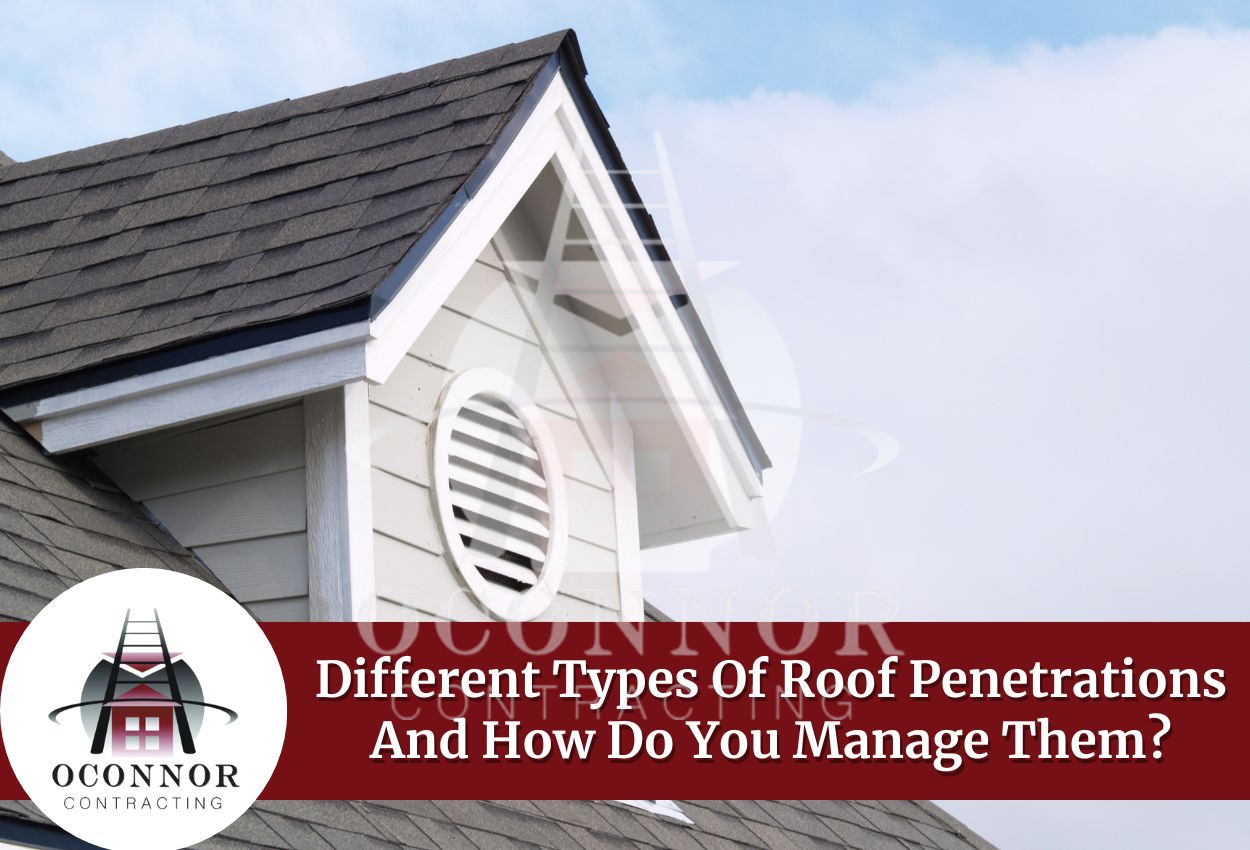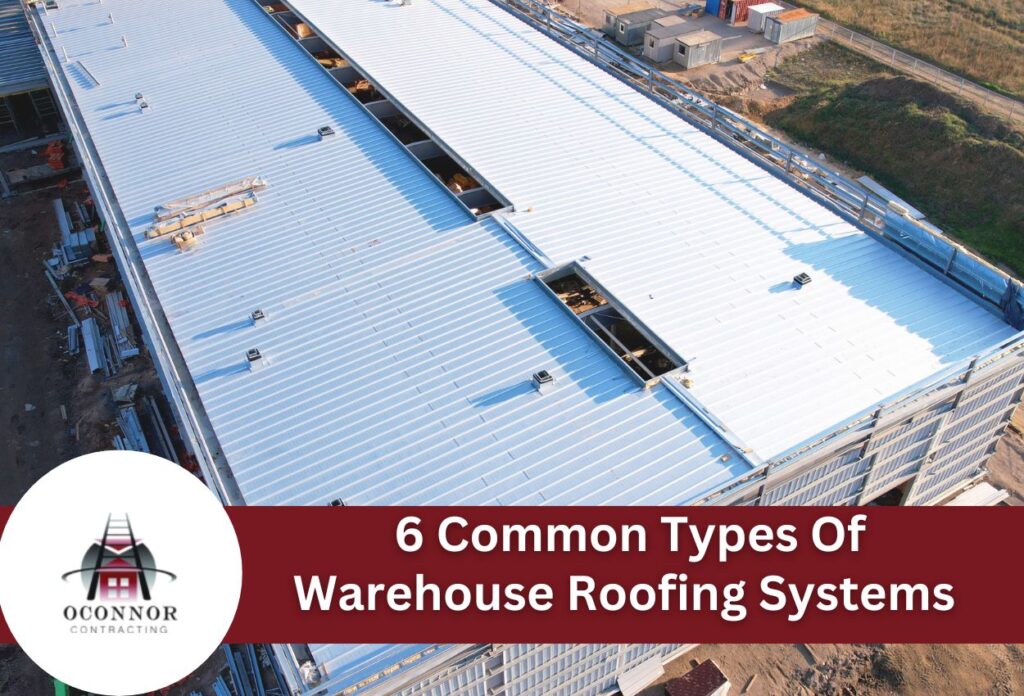
Warehouses play a very important role for business owners. As the need for efficient storage solutions grows, so does the demand for strong, durable, and long-lasting warehouse roofing systems. Sturdy roofs not only protect goods but also improve energy efficiency, safety, and overall operational effectiveness.
To help you make the best decisions for your commercial roofing needs, let’s take a look at the six best roofing options for warehouses.
Best Industrial Warehouse Roof Types
#1. Metal Roofs
Cost: $2 to $15 per square foot

The first option on our list is metal roofs, an excellent choice for warehouses due to their longevity and low maintenance requirements. Their lightweight design enables simple installation without the need for extensive scaffolding or supports, minimizing disruptions.
Furthermore, metal roofs are non-combustible, making them an excellent choice for warehouses with a higher fire risk. When choosing a metal roof for your warehouse, it is important to choose the best style to ensure proper installation and avoid potential problems.
> Standing Seam Metal Panels
Standing seam metal roofs on warehouses excel due to their durability and weather resistance. They feature concealed fasteners for tight seals, are lightweight, easily meet standards for wind uplift and fire resistance, and offer cost-effectiveness.
> Corrugated Metal Panels
Corrugated metal roofs are also popular for warehouses because they are easy to install, affordable, and durable. Lightweight, they maximize space, reflect heat, and cut cooling costs. They offer a practical, cost-effective solution.
| PROS | CONS |
| Longevity: Lasts 40-70 years, outlasting other options. Durability: Withstands heavy rain, hail, and high winds. Energy Efficiency: Reflects solar heat, cutting up to 25% of cooling costs. Environmental Sustainability: Contains recycled materials and is fully recyclable. Style and Aesthetics: Available in various styles and finishes. Safety: Fire-resistant and does not spark during wildfires or lightning. | Cost: More expensive to install than other materials. Noise: Can be noisy during heavy rain or hail. Denting: Aluminum and copper roofs may dent due to impacts like hail. Installation Challenges: Requires specialized labor, increasing costs. |
#2. Modified Bitumen
Cost: $4 to $8 per square foot
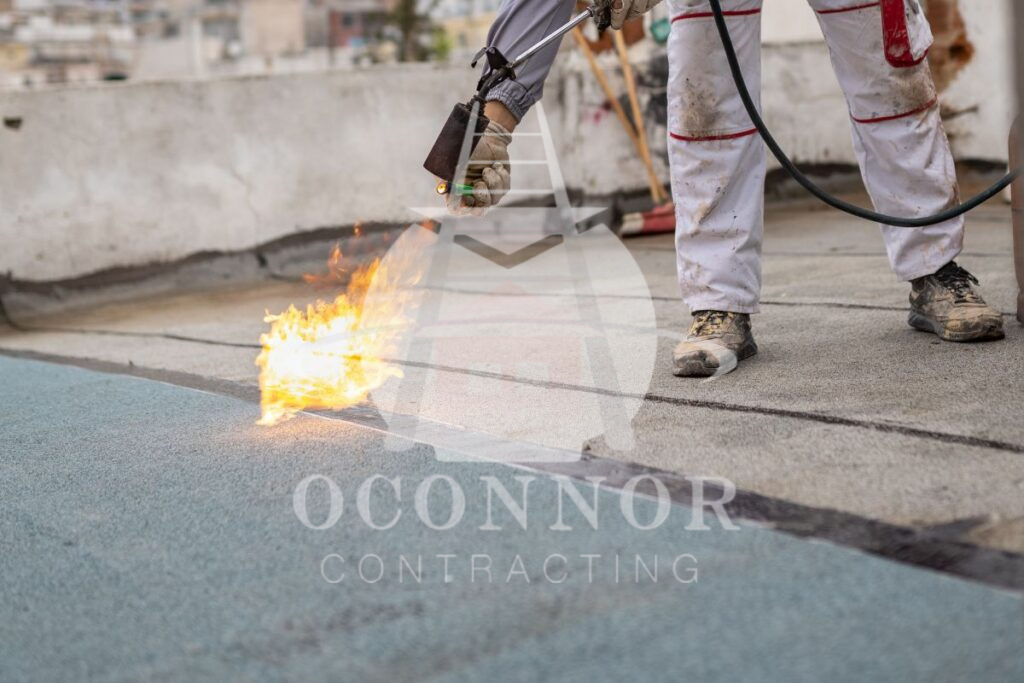
The next option, modified bitumen, stands out as a preferred option for warehouses. Formulated by blending asphalt with plastic or rubber polymers, it is highly flexible. It demonstrates exceptional resistance to impacts and tears, rendering it ideal for areas subject to heavy foot traffic or harsh climates.
Despite being pricier than other alternatives, modified bitumen roofs have a lifespan of up to 20 years or more when properly maintained. Furthermore, this roofing option presents high UV resistance and can be installed with a smooth or granulated finish, ensuring a strong solution for warehouses.
| PROS | CONS |
| Durability: Multiple plies make it resistant to damage and wear. Ease of Use: Sheets are easy to maneuver and repair-friendly without solvents or adhesives. Compatibility: Works well with asphalt-based roofing compounds for easy repairs. Excellent Seal: Provides a waterproof, leak-resistant seal. | Heat Absorption: Absorbs sunlight, increasing cooling costs. Higher Cost: More expensive due to enhanced durability and performance. Ponding Issues: Can accumulate water, leading to structural problems. Shorter Lifespan: Typically lasts 10-30 years, shorter than other materials. |
#3. Spray Polyurethane Foam (SPF) Roof
Cost: $3 to $7 per square foot

For warehouse roofs, spray polyurethane foam (SPF) is another top choice. SPF creates a seamless, leak-proof membrane by expanding and tightly adhering to the roof surface. It can be applied in different thicknesses to enhance drainage and prevent ponding.
SPF roofs boast excellent roof insulation properties, minimizing energy consumption. They’re also lightweight, enabling installation over existing roofs without exceeding structural load limits. The seamless, durable, and energy-efficient nature of SPF makes it an ideal roofing solution for warehouses.
| PROS | CONS |
| Waterproof and Durable: Creates a seamless, waterproof barrier resistant to hail and wind damage. High Insulation Value: High R-value for effective insulation. Improves Air Quality: Reduces air infiltration, enhancing indoor air quality. Versatile: Suitable for cold, tropical, subtropical, and desert climates. | Drainage Needed: Requires proper drainage to prevent water buildup. Weather-Dependent Installation: Must be installed under specific weather conditions. Annual Maintenance: Needs inspections at least twice a year. Foot Traffic Vulnerability: Susceptible to damage from foot traffic and impacts. Thermal Shock Sensitivity: Offers limited protection against thermal shock. |
#4. Built-Up Roofing (BUR) System
Cost: $4 to $10 per square foot
Another great option for warehouse roofing systems is a built-up roof (BUR), which is durable and cost-effective. This multi-layered roofing system involves alternating layers of bitumen and reinforcing fabrics, creating a strong, watertight membrane.
BUR roofs protect against leaks, severe weather, and UV damage, making them well-suited for flat or low-sloped warehouse roofs. Their layered structure provides exceptional durability and weather resistance. Additionally, BUR roofs are relatively easy to install, maintain, and repair, adding to their practicality for warehouse applications.
| PROS | CONS |
| Superior Waterproofing: Excellent leak prevention. Fire Resistance: Inherently fire-resistant materials. Low Maintenance: Minimal upkeep, lasts 20-30 years. Cost-Effective: Durable and low maintenance over time. | Heavy: Adds significant weight, and may need reinforcement. Vulnerable to Damage: Prone to punctures and tears. Time-Consuming Installation: Lengthy installation leads to higher labor costs. Skilled Contractors Needed: Requires experienced contractors. |
#5. Thermoplastic Polyolefin (TPO)
Cost: $3.50 to $14 per square foot
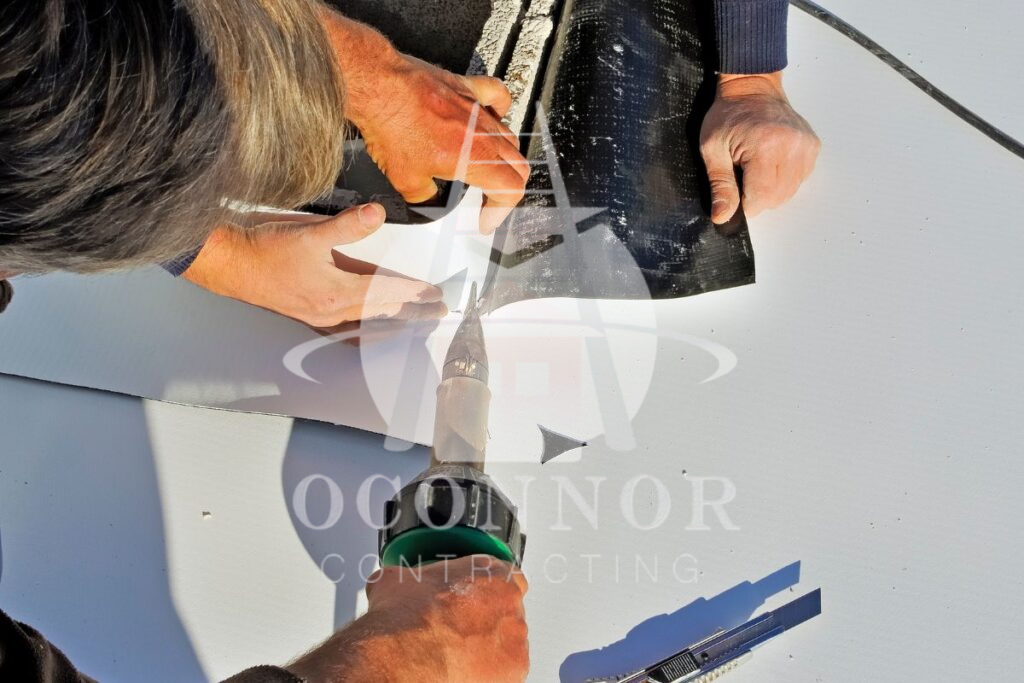
With many advantages, thermoplastic polyolefin (TPO) is a favorable option for warehouses. TPO is a flexible, white, lightweight material that resists corrosion, algae, and mold growth. Its easy installation, with rolled sheets bonded together, streamlines the process. The highly reflective nature of TPO reduces heat absorption, translating to lower energy costs.
Furthermore, TPO is exceptionally durable and can endure extreme temperatures across diverse climates. Its resistance to chemicals, pollution, and emissions also makes it well-suited for industrial environments.
| PROS | CONS |
| Energy Efficiency: Highly reflective, exceeding Energy Star requirements, reduces heat absorption and cooling costs. Durability: Resistant to tears, punctures, impacts, and extreme weather conditions. Cost-Effectiveness: Relatively affordable compared to other options. Easy Installation: Lightweight and quick to install, reducing labor costs and time. | Longevity: Typically lasts 15-30 years, shorter than some other roofing materials. UV Degradation: Susceptible to damage from UV rays, potentially causing adhesive deterioration and leaks. |
#6. Ethylene Propylene Diene Monomer (EPDM)
Cost: $3.50 to $10 per square foot
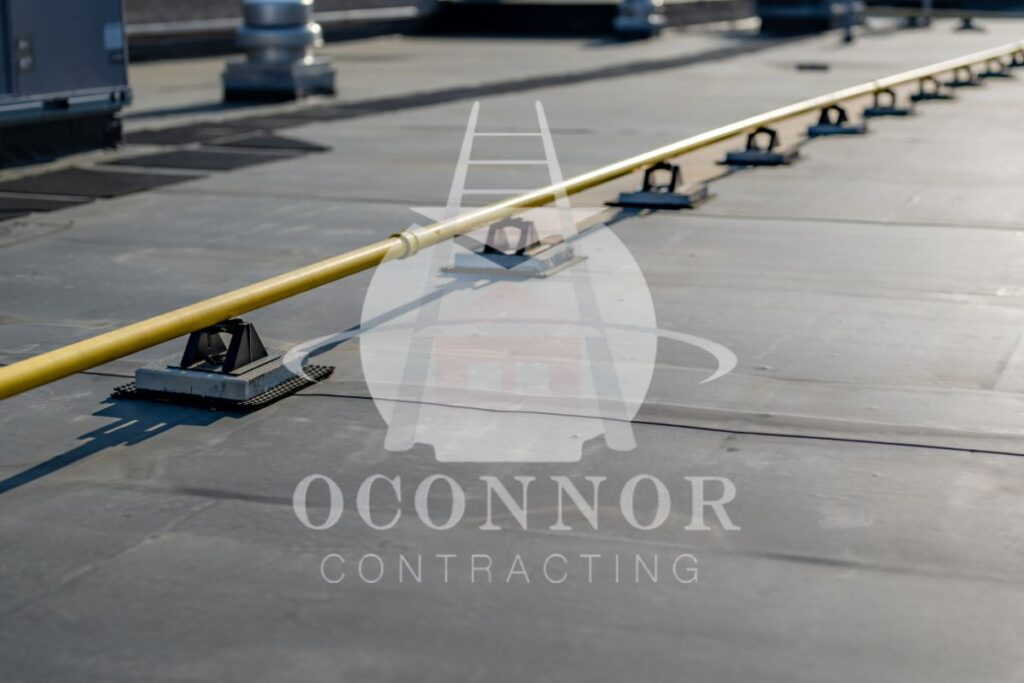
The last option, ethylene propylene diene monomer (EPDM) roofing, is a common choice for warehouses. Made from synthetic rubber, EPDM systems offer high resistance to weathering, UV rays, and chemical exposure, ensuring a sturdy roof.
Their flexibility allows for expansion and contraction with temperature changes without cracking or breaking. EPDM roofs are also relatively simple to install and maintain, minimizing the need for frequent warehouse roof repair and replacements. Overall, EPDM provides warehouses with a durable, cost-effective, and low-maintenance solution that can endure harsh conditions over an extended service life.
| PROS | CONS |
| Cost-Effective: One of the least expensive roofing materials to install and repair. Durable and Long-Lasting: Can last 20-50 years with proper maintenance, resistant to wind, hail, UV radiation, and extreme temperatures. Easy to Restore: Easily patched or repaired with a patch kit if damaged. Flexible: Very flexible, suitable for various roof types and shapes. | Puncture Prone: Vulnerable to punctures from sharp objects, though thicker membranes offer better protection. Aesthetic Limitations: Flat, dull appearance may not enhance building aesthetics. Heat Vulnerability: Can shrink, stretch, or crack under prolonged exposure to extreme heat. Ponding Risk: Prone to water damage if not installed with proper slope and sealed seams. |
Conclusion
When selecting a warehouse roofing material, consider durability, energy efficiency, and maintenance requirements. Each type we have mentioned above provides distinct advantages and applications, however, consultation with a professional roofer is essential for determining the best option that fits your warehouse needs.
To get the best commercial roofing solutions, choose OConnor Contracting. We specialize in durable, energy-efficient roofing systems tailored to your needs. Whether it’s installation, repairs, or maintenance, rely on our expertise for top-quality roofing services. Give us a call at (716) 600-7663.



